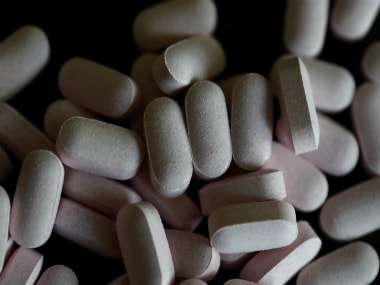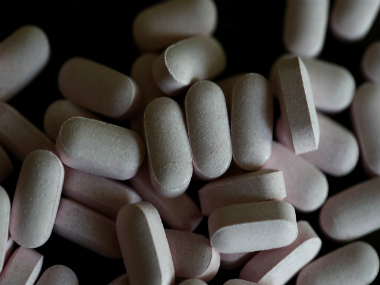You have probably heard of B-complex. Maybe you’ve even taken a few B-complex capsules now and again. But what is B-complex, and just how many B vitamins are there to form a whole complex? The simple answer is eight. (No, they don’t run from B1 through B8. The eight B vitamins are B1, B2, B3, B5, B6, B7, B9, and B12). [caption id=“attachment_7794651” align=“alignleft” width=“380”]  Representational image. Image source: Getty Images.[/caption] Each of the B vitamins plays a crucial role in keeping us in brilliant health. While most of heard of folic acid and its benefits during pregnancy, few of us know about the other seven B’s. In this second article in a two-part series on vitamin and mineral supplements, we take a close look at the role each of the B’s plays in proper brain functioning, maintaining energy levels and promoting cell growth and whether we need to take supplements for any (or all) of them:
1. Thiamine (vitamin B1)
Thiamine is an essential vitamin which helps the body to change carbohydrates into energy at the cellular level. Food sources: Plant foods that are rich in vitamin B1 are asparagus, sunflower seeds, green peas, flaxseed, spinach, cabbage, eggplant, whole grains, and legumes. Tomatoes and onions also have a small amount of vitamin B1 in them. Animal sources of B1 include pork and offal. How much of it do you need in a day: For men: 1.2 milligrams (mg). For women: 1.1 mg. For pregnant women: 1.4 mg, and for lactating women: 1.5 mg. For children, 0.2-1.2mg. Verdict on supplements: You get tiny amounts of vitamin B1 from practically every (healthy) thing you eat. So you don’t need to take supplements if you’re taking a proper diet or unless your doctor prescribes.
2. Riboflavin (vitamin B2)
The coenzymes present in riboflavin play a major role in energy production (by breaking down carbohydrates), cellular growth and function and the metabolism of fats, drugs, and steroids. Food sources: All the cruciferous vegetables like cauliflower, cabbage, kale, garden cress, bok choy, broccoli and Brussels sprouts are rich in riboflavin. All these vegetables should be lightly steamed and not cooked to a pulp to extract the maximum riboflavin from them. Other food sources of riboflavin include chicken, liver, meat, pork, dairy products, nuts, mushrooms and asparagus. How much of it do you need in a day: For men: 1.3 mg. For women: 1.1 mg. For pregnant women: 1.4 mg, and for lactating women: 1.6 mg. For children: 0.3-1.3 mg. Verdict on supplements: If you are lactose intolerant or if you have a gut infection, then you need to take B2 supplements. The reason: our intestines are not very good at absorbing it from food.
3. Niacin (vitamin B3)
Niacin helps in cutting down bad cholesterol (LDL), thus lowering the risk of cardiovascular diseases. Food sources: Grilled chicken breast, liver, turkey breast, red salmon, cooked brown rice, enriched breakfast cereals (muesli), dry roasted peanuts, grains and legumes are rich sources of niacin. How much of it do you need in a day: For men: 16 mg NE. For women: 14 mg NE. For pregnant women: 17 mg NE, and for lactating women: 18 mg NE. For children: 2-16 mg NE. NE stands for niacin equivalent. An amino acid called tryptophan does a similar job to this vitamin, but you need it in higher quantities: 1 mg NE = 1 mg niacin or 60 mg of the essential amino acid tryptophan. One cup of cooked brown rice contains 5.2 mg NE whereas 84 grams of grilled chicken breast has 14.9 mg NE. Verdict on supplements: One bowl of chicken and rice is enough to give you your daily dose, so avoid supplements unless your doctor recommends otherwise: high-dose niacin is sometimes prescribed by doctors to lower cholesterol levels. You should not take niacin supplements without a doctor’s prescription.
4. Pantothenic acid (vitamin B5)
Vitamin B5 keeps our energy up by metabolising carbohydrates, fats and proteins. It is rich in coenzyme A which helps in the synthesis of fatty acids, which are required for energy production in the body. Food sources: Mushrooms, avocados, broccoli, sweet potatoes, corn, cauliflower, yeast, peanuts, sunflower seeds, whole-grain cereals, dairy products, legumes and animal sources like pork, chicken and liver are rich in vitamin B5. How much of it do you need in a day: For men: 5 mg. For women: 5 mg. For pregnant women: 6 mg, and for lactating women: 7 mg. For children, 1.7-5 mg. Verdict on supplements: People must stick to dietary sources for meeting the recommended dose, as taking vitamin B5 supplements without prescription may cause harm to your body. An overdose of vitamin B5 can cause diarrhoea and increase the risk of bleeding.
Also read: Not just weight loss: **_An avocado a day keeps diseases away_**
5. Pyridoxine (vitamin B6)
Pyridoxine helps the central nervous system pass messages through neurotransmitters like serotonin - the happiness hormone. It also helps in improving brain function. Food sources: Chickpeas, yellowfin tuna, chicken breast, tofu, avocados, brown rice, milk, potato, spinach, and whole-grain cereals are rich sources of vitamin B6. How much of it do you need in a day: For men: 1.3-1.7 mg. For women: 1.3-1.5 mg. For pregnant women: 1.9 mg, and for lactating women: 2 mg. For children: 0.1-1.3mg. One cup of chickpeas contains 1.1 mg of vitamin B6 whereas 84 grams of grilled chicken breast contains 0.5mg of vitamin B6. Verdict on supplements: You can get your daily fix of vitamin B6 from food. Take supplements only if your doctor recommends them, as an overdose may cause temporary peripheral neuropathy (loss of feeling in the arms and legs).
6. Biotin (vitamin B7)
Good nails, hair and skin, and a great metabolism are the chief health benefits of vitamin B7. It also helps in metabolizing fats and carbohydrates for energy. Food sources: peanuts, milk, cereals, beans, organ meats like liver, whole cooked eggs, sunflower seeds, sweet potato, almonds, wheat bran, cheddar cheese, mushrooms and cauliflower are rich sources of biotin. How much of it do you need in a day: For men: 30 micrograms (mcg). For women: 30 mcg. For pregnant women: 30 mcg, and for lactating women: 35 mcg. For children: 5-25 mcg. One large cooked egg contains 10 mcg of biotin. About 84 grams of cooked chicken liver contains 30.8 mcg of biotin. Verdict on supplements: If you eat a balanced diet, it is unlikely that you will have a biotin deficiency. However, conditions like seborrheic dermatitis (a skin condition that causes a scaly, itchy rash), heavy drinking and surgical removal of the stomach can cause biotin deficiency. Supplements must be taken after seeking medical advice.
7. Folate (vitamin B9)
Just like the other B vitamins, folate helps in metabolising fats and proteins in the body. It also plays a major role in clearing out high levels of homocysteine, an amino acid that may lead to the development of various diseases including heart disease. Folate is the naturally occurring vitamin B9, and folic acid is the synthetic or manmade form of vitamin B9. Food sources: mushrooms, broccoli, lentils, beans, spinach, lettuce, avocados, beans, egg yolk, garden asparagus, beetroot and organ meat like liver are rich sources of folate. How much of it do you need in a day: For men: 400 mcg. For women: 400 mcg. For pregnant women: 600 mcg, and for lactating women: 500 mcg. For children: 80-400 mcg. Half a cup of boiled spinach gives you about 131 mcg of folate. Verdict on supplements: Food should be your primary source of B9, unless you’re planning to get pregnant or going through menopause - in both cases you’ll need to take supplements as prescribed by your doctor.
8. Vitamin B12
Vitamin B12 helps in energy production in the body. It is also essential for proper brain function and the synthesis of red blood cells. Food sources: vitamin B12 is naturally found in fish, meat, eggs, and dairy products like cheese, milk, yoghurt. How much of it do you need in a day: For men: 2.4 mcg. For women: 2.4 mcg. For pregnant women: 2.6 mcg, and for lactating women: 2.8 mcg. For children: 0.4-2.4 mcg. Verdict on supplements: vegetarians, people above the age of 50 years, people with gastrointestinal diseases like Crohn’s disease and people who consume alcohol regularly are more prone to vitamin B12 deficiency. They must seek medical advice before starting any supplements. This is the second article in a two-part series. The _first article_ in this series talked about vitamins - A, C, D, and minerals like calcium and iron. For more information, please read our article on Vitamin B: Benefits, Sources, Dosage_._ Health articles in Firstpost are written by myUpchar.com, India’s first and biggest resource for verified medical information. At myUpchar, researchers and journalists work with doctors to bring you information on all things health.


)

)
)
)
)
)
)
)
)



